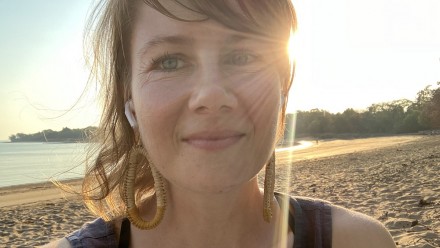Blessing and burden: Personal Protective Equipment during COVID-19
As COVID-19 hit Australian shores in early 2020, our frontline workers feared that the healthcare system would be overwhelmed with critically unwell patients, as seen overseas. Fortunately, the large waves did not come until later, giving the health workforce the time to learn from other countries and prepare.
That’s not to say that the fear of the unknown didn’t take its toll, especially in March/April 2020 when there was a global shortage of Personal Protective Equipment (PPE).
New research from the Australian National University (ANU) has investigated the impact of the pandemic on Australian Capital Territory (ACT) healthcare workers – such as doctors, nurses and allied health workers - with a focus on the use of PPE.
The project was part of a global initiative led by University College of London with teams of researchers in 20 countries using rapid appraisal to explore the experiences of healthcare workers delivering care during the COVID-19 pandemic.
ANU Doctor of Medicine and Surgery students Ms Sarah Fitzgerald, Mr Chad Kaye and Mr Timothy Walters were involved in the Australian arm of the study, under the supervision of Professor Cathy Banwell, Associate Professor Anna Olsen, Professor Christine Phillips and Dr Ashwin Swaminathan.
Ms Fitzgerald explained, “Although our frontline workers here in the ACT had time to prepare and access PPE – more so than some other countries – the general uncertainty in those early months was still acute.”
“At the beginning of the outbreak, it was unknown if the PPE provided was fallible to COVID-19 infection and there was a real fear amongst frontline health care workers that they may contract COVID-19 and potentially expose their family or the community to the virus.”
“Many of the research participants reported preparing for the possibility of prolonged periods of time separated from family and reflected on the need to adapt their home life to reduce this risk.”
“This included limiting time spent at home, planning to stay in alternate accommodation in isolation if required, and limiting interactions with the community between shifts.”
“The enormous expectations placed on healthcare workers to protect the community required many to plan for a situation in which both their professional and personal lives were likely to be radically changed,” Ms Fitzgerald observed.
The research also found that having standardised processes and training frontline workers in the use of PPE was a key to enhancing confidence and reducing fears, particularly for those in the hospital setting.
“As the pandemic progressed, the implementation of standardised PPE processes improved healthcare workers’ skills and confidence in utilising PPE.”
“One successful strategy was the introduction of a peer-to-peer supervision model within the hospital setting and COVID-19 testing sites which acted as a key safety mechanism to ensure all staff complied with infection control practices. The shared ownership of applying PPE processes improved healthcare worker’s confidence in the processes,” Ms Fitzgerald pointed out.
However, replicating these PPE procedures and processes in the community health setting, such as community health clinics or home based services, proved more challenging.
“Some ACT participants felt vulnerable to what they viewed as inadequate PPE practices in their workplaces, reducing confidence. This was a similar experience reported by frontline health care workers in the UK who identified PPE training, particularly in community health settings, as being inadequate,” Ms Fitzgerald said.
Although the majority of healthcare workers in this study reported feeling confident with the safety and utility of PPE, wearing it presented other issues. In line with experiences reported in the UK, ACT healthcare workers found PPE uncomfortable, and a barrier to delivering optimum care to patients.
Ms Fitzgerald noted, “Whilst the healthcare workers acknowledged that PPE use was best practice to minimise the spread of the virus, for some the PPE was burdensome and compounded the stress and anxiety experienced on the frontline.”
“They felt communication was particularly difficult due to the masks and the restrictive nature of the COVID-19 work environments.”
“It (PPE) also acted as an emotional barrier to connecting with patients. In some instances, they felt this impacted their ability to deliver compassionate care which caused distress for both the healthcare worker and the patient.”
Ms Fitzgerald’s efforts on the project were acknowledged with the John Buckingham Research Project Award in the Humanities category.
“The award was very unexpected but I am very grateful to have received it. The project was a team effort and I’d like to acknowledge the research group for making the project possible. I would also like to acknowledge the ongoing efforts and dedication of our frontline healthcare workers here in the ACT.”
The collective findings from the research project were recently published as an e-book.














